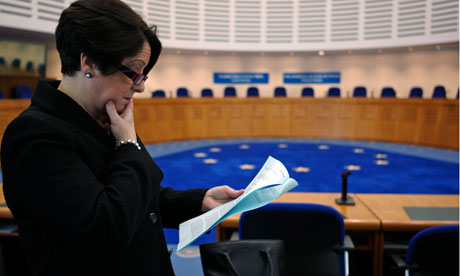Sarah Boseley and Henry McDonald, guardian.co.uk, Thursday 16 December 2010

The Irish government is under pressure to reform its abortion legislation after the European court ruled that failure to provide services to a woman whose life could have been at risk was a breach of her human rights.
The Strasbourg judgment was only a partial victory for campaigners; the European court of human rights rejected the cases of two other women who claimed they had suffered hardship by being forced to travel to the UK for an abortion. But its decision in the case of C, a woman who had suffered a rare cancer and believed her pregnancy might cause it to return, left pro-abortion groups with the hope at least of clarification of the law where the woman's life is in danger.
"Today's decision is a landmark one for Ireland and, in particular, for women and girls," said Niall Behan, chief executive of the Irish Family Planning Association. "The very considered and clear view of the European court of human rights leaves no option available to the Irish state other than to legislate for abortion services in cases where a woman's life is at risk.
"As a first and immediate step, we are calling on the government to set out how it intends to address today's ruling, and ensure that no further violations of human rights take place because of the state's failure to offer safe and legal abortion services, in – albeit – limited circumstances."
As rulings of the European court are binding, the Irish government will be under pressure to implement a woman's right to an abortion if her life is at risk. It is understood that the judgment is being considered by the republic's department of health and the Irish attorney general.
Abortion is banned in the republic and legalising it requires a referendum to change the constitution. Following a referendum in 1983, the unborn child is an Irish citizen with full rights.
As the next Irish government, following elections in March, is likely to be comprised of Fine Gael and Labour, the prospect of a referendum on abortion could prove divisive. Fine Gael opposes abortion, but many in the Irish Labour party support a woman's right to choose.
About 5,500 women are thought to travel to England and Wales every year from the republic to seek an abortion, at considerable cost and distress.
The first of the three women who took their cases to the European court was a recovering alcoholic whose four children had been placed in foster care. She sought an abortion because she believed another baby would jeopardise her chances of getting her children back. The court accepted she was living in poverty – she borrowed from a money-lender to travel to a private clinic in London. The second woman was unmarried and not prepared to become a single parent.
In both cases, the court ruled Ireland had not breached the women's human rights. But it took a different view of the woman who feared her rare cancer might return.
"The court considered that the establishment of any such risk to her life clearly concerned fundamental values and essential aspects of her right to respect for her private life," said the judgment. If her doctor found her health was at risk and advised an abortion, both ran a serious risk of criminal conviction and imprisonment if his view was later found to be against the Irish constitution, it said.
Tracey McNeill, director of Marie Stopes International in UK and western Europe, said: "The court highlighted that the law needs to be changed to ensure that doctors feel confident that they won't face prosecution for providing abortions if the woman's life is considered to be at risk. What we would like to see in the future is Irish women having the same fundamental rights to choose as people in the rest of Europe."
All-Ireland Primate Cardinal Sean Brady said the judgment leaves future policy in protecting the lives of unborn children in the hands of the Irish. : "The direct destruction of an innocent human life can never be justified, however difficult the circumstances," Cardinal Brady said. ". We are always obliged to act with respect for the inherent right to life of both the mother and the unborn child in the mother's womb.
"No law which subordinates the rights of any human being to those of other human beings can be regarded as a just law."
He added that as a society we all have a responsibility to respond sensitively to any woman who finds herself dealing with an unplanned pregnancy."
guardian.co.uk © Guardian News and Media Limited 2010
Source: http://www.guardian.co.uk/world/2010/dec/16/ireland-urged-reform-abortion-legislation?CMP=EMCGT_171210&
No comments:
Post a Comment